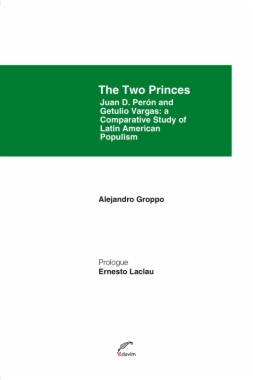This book is a comparative study of the political emergence of Perón in Argentina and Vargas in Brazil. It seeks to describe and explain how and why Peronism and Varguism were two different political projects. Using the tools of political discourse theory, this book scrutinizes the implications Perón and Vargas had for the formation of the political identities of the socio-political actors in both countries. The book shows to what extend the differential character of the process of formation of political identities had to do both with the structural context in which Vargas and Perón developed their strategy as well as which the specific ways in which both leaders intervened in the political formation. In this sense, the research stresses the specific discursive and institutional modes of intervention that characterized these who leaders' projects and their role in the political imaginary they inaugurated. It does so by tracing the responses to Perón and Vargas by different socio-political actors and the polemic context in which those responses took place.
- Cover
- Title page
- Copyright page
- Table of Contents
- Acknowledgements
- Foreword
- Introduction
- I. Implicit Imagery on Vargas and Perón
- II. Book Structure and Arguments
- Chapter One. Political Discourse Theory as a Tool for Comparative Analysis
- I. Political Discourse Theory
- A. Political Discourse Theory’s View of Society
- B. Political Discourse Theory’s view of the Subject
- C. Towards the Specificity of Antagonistic Political Identities
- II. The Comparative Dimension
- Chapter Two. Revisiting Varguism and Peronism
- I. Discussing the Literature: Comparative and Focused
- A. Relevance at the comparative level
- B. Relevance for focused literature
- II. Conclusions
- Chapter Three. The Political Conditions for the Emergence of Perón, 1932-1943
- I. The Political Conditions of the Revolution of 1943
- A. Concordancia and the Socialist Party
- B. Unión Cívica Radical
- C. Ortiz’s Period
- D. The Communist Party and the Impossibility of a Political Front
- E. Castillo and the Fall of the Regime
- II. Perón and the June Revolution
- A. The Political Reception of the Revolution
- B. Revolutionising the Revolution: Perón’s Transformation of the Revolutionary Path
- III. Conclusions
- Chapter Four. The Trajectory of Peronism: From Antagonism to its Closure
- I. The Opposition to Perón: Encircling the Threat
- A. The opposition within Grupo de Oficiales Unidos(GOU)
- B. The Logic of the Statute of the Rural Worker (SRW)
- C. Perón’s Political Naming: the Rural Worker as Slave
- D. The National Dimension and the Regulative Power of the Statute of the Rural Worker
- E. The Reception of the Statute of Rural Worker
- F. Opposition to Aguinaldo (Sueldo Anual Complementario-SAC)
- II. The Basis for a Common Political Front Against Perón:
- A. Union Democrática
- B. The Socialist Party
- C. Unión Cívica Radical
- D. Communists and Conservatives Against Peronism
- III. Encircling the Peronist Retreat
- A. From Revolution to Organisation: Tracing the Discursive Retreat
- B. Tracing the Policy Retreat
- IV. Conclusions
- Chapter Five. The Formation of Political Identities in Brazil, 1930-1934
- I. Getulio Vargas and the Revolution of 1930
- A. Vargas and the Paulista Dominant Elite
- B. Vargas as the Signifier of Consent
- II. The Political Antagonism of the Revolution: Oligarchy vs Tenentes
- A. Tenentes as a Political Threat
- B. Luis Carlos Prestes’ Political Intervention
- C. The Logic of the May Manifesto and the Political Naming
- D. Reception of the Manifesto: Encircling the Abyss
- III. Conclusions
- Chapter Six. Vargas, Ideological Conflict and the Impossible Politicisation of the Social
- I. Communism vs Integralistas
- A. Açao Integralista Brasileira (AIB)
- B. Alianza Nacional Libertadora (ANL)
- C. Monster Law
- II. The Impossible Politicisation of the Social: Regionalism and a Non-Antagonistic Economic Elite
- A. The Social and Economic Order Post–1934
- B. The Reception of Article 121
- C. The Law of Minimum Wage and its pattern of Continuity
- D. The Reception of the Consolidation Labour Laws and União Democrática
- III. Conclusions
- Conclusions
- Relevance at the Theoretical Level
- Relevance at the Empirical Level
- Bibliography
- Appendix

